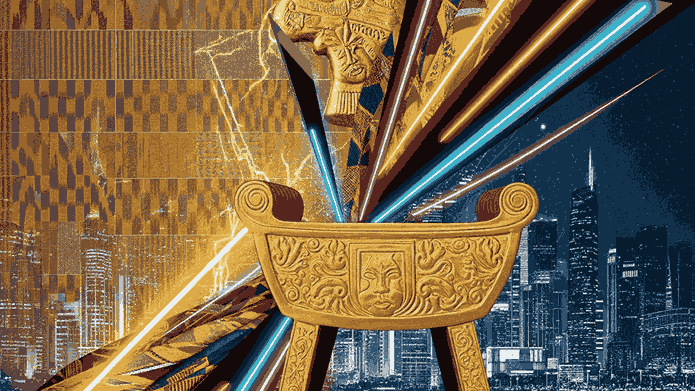In an increasingly globalized and interconnected world, the concept of “identity” has become more fluid, complex, and often, more fragmented than ever before. We are constantly exposed to diverse cultures, conflicting ideologies, and the relentless pull of mainstream narratives. Yet, amidst this dynamic landscape, there exists a profound and enduring anchor: our cultural roots. For many, this heritage is not just a historical footnote but a living, breathing influence that quietly, yet powerfully, shapes who we are, how we perceive the world, and where we belong.
For Jesse Yaw, a Ghanaian intellectual and author whose heritage is deeply sewn into the fabric of the Royal Ashanti tribe of the Akan people, this connection to cultural roots is not merely academic; it is foundational to his very being and central to his exploration of self-determination. His journey, documented in his compelling works, highlights the intricate dance between ancestral legacy and modern lived experience. But how does an ancient echo, like that of the Ashanti, resonate in our contemporary lives? How do these deep cultural roots provide both a compass and a shield in the complex tapestry of modern identity? This article will delve into the enduring power of heritage, explore the challenges of navigating a multifaceted identity, and offer pathways to reconnect with the invaluable wisdom embedded in our cultural origins.
The Enduring Power of Heritage: More Than Just History
Heritage is far more than a collection of historical facts or distant ancestors. It is a vibrant, living entity comprising shared values, collective memories, sacred traditions, foundational stories, and a distinctive way of viewing the world. It’s the invisible thread connecting generations, providing a sense of continuity and belonging that transcends geographical boundaries and temporal shifts.
For the Ashanti people, a major ethnic group of Ghana, heritage is particularly rich and influential. Renowned for their powerful ancient kingdom, sophisticated artistry (like Kente cloth and Adinkra symbols), and complex social structures, Ashanti values are deeply embedded in their cultural fabric. Principles such as ‘Sankofa’ – looking back to the past to move forward – and a profound respect for wisdom, community, and courage are not just historical concepts but living guidelines. The Golden Stool, the sacred symbol of Ashanti unity and power, represents the very soul of the Ashanti nation, embodying their collective identity and destiny.
This enduring legacy provides a unique lens through which individuals connect to a collective strength and a shared purpose. It offers a framework for understanding moral principles, social responsibilities, and even personal conduct. In a world often characterized by individualism and transient trends, the grounding provided by a strong cultural heritage offers stability, resilience, and a profound sense of self-worth that comes from knowing one is part of something much larger and timeless. It is this deep well of wisdom and collective experience that continues to flow through the veins of modern Ashanti descendants, empowering them to navigate the complexities of contemporary life with a rooted sense of self.
Modern Identity: A Tapestry of Influences and Navigating Assimilation
Our modern identity is rarely singular. It’s a dynamic tapestry woven from multiple threads: our cultural heritage, our nationality, our local community, our personal experiences, our digital personas, and the global influences that permeate our daily lives. For individuals with a rich cultural background, particularly those from diasporic communities, navigating this tapestry often involves a delicate balance between preserving ancestral traditions and adapting to the norms of a dominant culture. This balancing act can be a profound source of strength, but it can also present significant challenges, especially concerning assimilation.
Assimilation, the process by which a person or a group’s language and/or culture come to resemble those of another group, can be a double-edged sword. While it may offer pathways to integration and opportunity in a new society, it often comes at the cost of suppressing, diluting, or even losing one’s original cultural identity. For Black communities in the Western world, as Jesse Yaw profoundly explores in his work, this process has historically been fraught with perils, rooted in colonial legacies and prejudiced norms. The psychological impact of assimilation to Westernized ideologies – whether in beauty standards, governance, education, or economics – can be crippling, leading to a deconstruction of self-perception and a subdued sense of one’s full potential.
The digital age further complicates this. Social media, while connecting us globally, can also create a pressure cooker of curated identities and cultural homogenization. We are constantly bombarded with idealized versions of reality that may be far removed from our authentic cultural heritage. This external noise can make the internal echo of our roots seem faint, leading to a disconnect between who we are truly meant to be and the persona we feel compelled to project. Reclaiming a modern identity that honors its cultural roots requires intentionality—a conscious effort to acknowledge, value, and integrate one’s heritage without succumbing to the pressures of complete assimilation.
Reclaiming the Echo: Practical Steps to Connecting with Your Roots
Connecting with your cultural roots in a meaningful way is a journey of self-discovery and empowerment. It’s an active process of listening for the “echo” of your heritage and allowing it to inform your modern identity.
1. Research and Rediscover Your Ancestry:
Knowledge is the first step.
- Family History: Talk to elders in your family. Document their stories, traditions, and experiences. Family narratives are living libraries of your heritage.
- Genealogical Research: Utilize online resources, historical archives, and even DNA testing (with caution and awareness of privacy implications) to trace your lineage and understand your ancestral origins.
- Historical Context: Learn about the history, philosophy, and socio-political landscape of your ancestral lands. Understanding the journey of your ancestors can provide profound insights into your own identity.
2. Engage with Cultural Practices and Traditions:
Bring your heritage to life through direct engagement.
- Language: Even learning a few phrases or a fundamental understanding of your ancestral language can create a deep connection to your roots.
- Cuisine: Explore traditional foods and cooking methods. Food is a powerful vehicle for cultural expression and memory.
- Arts and Crafts: Learn about traditional art forms, music, dance, or crafts. Participating in these practices can be a meditative and deeply authentic experience.
- Celebrations: Engage in cultural festivals, ceremonies, or religious practices unique to your heritage.
3. Seek Out and Build Community:
‘Identity thrives in community.
- Diaspora Groups: Connect with cultural organizations, community centers, or diaspora groups in your local area or online. Share experiences, learn from others, and find a sense of collective belonging.
- Mentorship: Seek out elders or cultural leaders who embody the values and knowledge of your heritage. Their guidance can be invaluable.
- Travel (When Possible): If feasible, visit your ancestral lands. Experiencing the culture firsthand can be a transformative and deeply grounding experience.
4. Reflect and Integrate Your Heritage into Your Modern Self:
This is where the echo becomes a conscious part of your voice.
- Journaling and Self-Reflection: Regularly ponder how your heritage influences your values, perspectives, and reactions to the world. How does it strengthen you? How does it differentiate you?
- Embrace Duality: Understand that holding onto your heritage does not mean rejecting your modern environment. It’s about integrating multiple facets of your identity to form a richer, more complex, and authentic self.
- Share Your Story: Speak about your heritage and its significance to you. Your authentic voice, rooted in your unique background, contributes to the richness of the global conversation.
The Strength of a Rooted Identity: Contribution to Global Harmony
Reclaiming and embracing your cultural roots offers profound personal benefits: a deeper sense of authenticity, increased resilience in the face of external pressures, unwavering pride, and access to a rich wellspring of ancestral wisdom. It fortifies your inner compass, providing clarity and purpose in a world that often seeks to fragment.
But the power of a rooted identity extends far beyond the individual. When individuals confidently embody their unique cultural heritage, they contribute to the vibrancy and diversity of the global tapestry. This is crucial for achieving racial, social, and global justice—core tenets of Jesse Yaw’s advocacy. Authenticity born from heritage challenges homogenized narratives, exposes prejudice, and empowers marginalized voices. It is a powerful form of self-determination that, when collectively embraced, contributes to the re-education of the human mind on a societal scale, fostering genuine understanding and a more equitable global village. The echo of Ashanti, and countless other heritages, strengthens humanity’s voice, reminding us that we are still standing, not just as individuals, but as a diverse, interconnected, and resilient global family.
Conclusion: Listen to the Echo, Amplify Your Voice
In a world that constantly pulls at the threads of our identity, the echo of our cultural roots offers profound grounding. As Jesse Yaw’s compelling work consistently demonstrates, acknowledging and embracing our heritage is not just an act of remembrance; it is an act of empowerment and re-education. It is through this deep connection that we fortify our authentic voice, navigating the complexities of modern identity with a clarity born of ancient wisdom.
Your heritage is a unique part of your truth. Listen for its echo. Let it guide you. Let it amplify your voice in the symphony of humanity.
- Dive deeper into the profound impact of identity and self-determination: [Button] Explore The Deconstruction of Humanity’s Voice, But We Are Still Standing
- Discover how intimate prose explores human nature and identity: [Button] Discover Jesse Yaw’s Poetry Collection, Silent Ebony
- Learn more about Jesse Yaw’s journey and philosophy




0 Comments